
What isn’t widely known is that a major factor contributing to hormone imbalances is Gut Dysbiosis. The gut microbiome can influence hormone levels through a number of distinct mechanisms and affects the production and metabolism of hormones.

Your colon is connected to your liver through the portal circulation. So, blood flow from your colon goes to your liver in a direct connection. Microbiome imbalances in your colon make toxins that are absorbed into your blood stream and overload your liver with items to detox. Especially if you have a leaky gut. Since your liver also normally breaks down your hormones (our hormones are made in the body but there is a continual cycle of breaking them down in the liver), if your gut microbiome is toxic, your body has difficulty breaking down the hormones your body makes naturally or that you take to increase your hormone balance.

When we prescribe bioidentical hormones to men and women, we always do follow-up blood test to determine what your body did with the hormones. If your liver is overloaded, the hormone levels can go too high into unhealthy ranges. To correct that, we need to improve your gut microbiome.

There are expensive lab tests to evaluate your gut, but we can usually determine what needs to be corrected using our advanced muscle testing techniques. Your colon can have parasites, unhealthy microbes, or sometimes a very low supply of healthy microbes. We live in a synergistic balance between our microbiome of our colon (which affects our microbiome everywhere) and our overall health.
To have a good microbiome balance we need to seed it with keystone bacteria that repairs our gut, feed the bacteria with fiber from organic fruits and vegetables, and stop killing the beneficial bacteria with antibiotics and roundup in our food choices.


Recent Comments